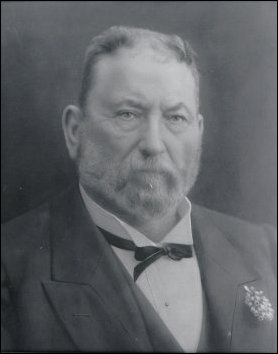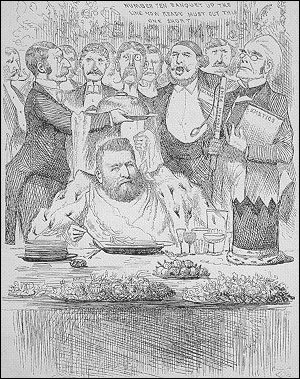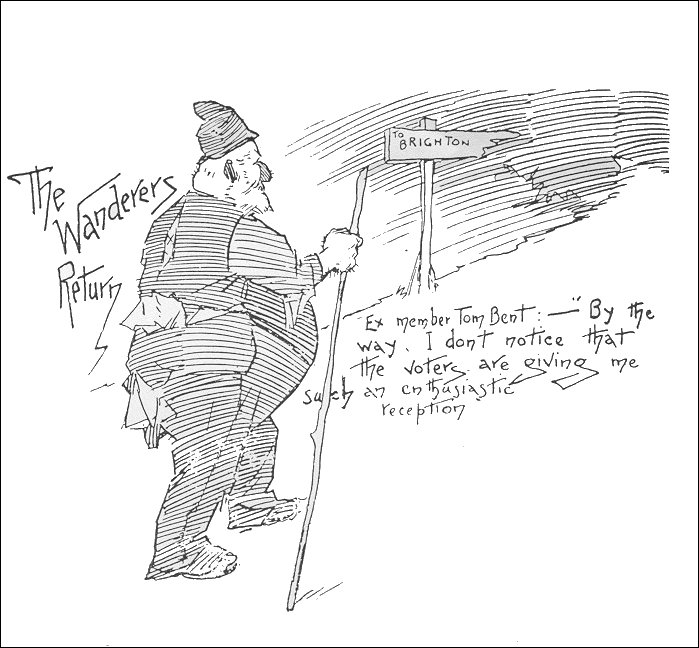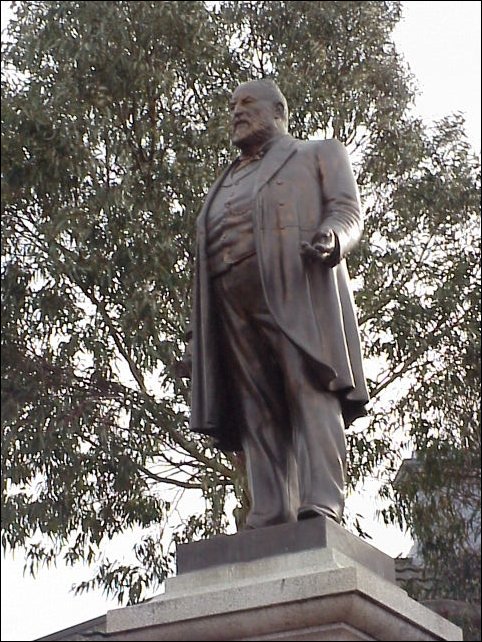Thomas Bent: Councillor and Politician

Sir Thomas Bent.
Bent's beginnings were humble. His mother, Maria, was a free Irish immigrant and his father, James, had been transported for housebreaking. They met at 'Regentville', the Penrith property of Sir John Jamison and their first child, Thomas, was born there on 7 December 1838. In 1849 the Bent family arrived in Melbourne, having travelled overland by dray. They lived briefly in Fitzroy but in 1851 moved to Moorabbin where James began work as a market gardener. This brought to an end Thomas's formal education as, aged 13, he left school to work alongside his father. By the time the Moorabbin Road Board District was established in June 1862 Thomas Bent was the rate collector for the neighbouring Municipality of Brighton and owned and operated his own market garden in Beers Road, Moorabbin. He stood, unsuccessfully, for election to this first board but two months later successfully tendered for the position of Moorabbin rate collector. At the 1863 annual meeting of Moorabbin ratepayers he again stood for election to the Road Board, this time successfully.
Bent was a bully and from the outset he dominated other Board Members. In 1866 he was elected Chairman of the Board in circumstances that caused considerable controversy. The minutes of the Board meeting of 27 August 1868 included a motion 'That the Chairman be authorised to employ day laborers for the district roads'. This was crossed out in the same ink with which the minutes were signed. It appears that, when read, the minute was not accurate. There seems little doubt that the 'error' was deliberate. At the time Bent was facing mounting pressure to explain the granting of a contract for road construction which he had directed to his father, James, without going through the proper tendering process. Had the 'mistake' not been detected Bent would have had 'official' sanction for his actions. The ploy had mis-fired but, not to be outdone, Bent had his other brother, John, who could not be a councillor unless he owned land, registered as a co-owner with his father of a property in the North Subdivision. Two weeks later, following the resignation of Cr. West, John Bent filled the casual vacancy thus created and joined his brothers, Thomas and Edmund, on the Moorabbin Board. Throughout Bent's career casual vacancies seemed to materialise just whenever he needed them.
With his two brothers and the co-operation of Cr McCarthy, Bent had a practical stranglehold on the board. In 1868 he simply presented the board with a fait accompli when he declared McCarthy elected to the chair for the coming year without bothering to call for a vote. Four other councillors protested but their protest achieved nothing. At the next meeting all four again protested this time by handing in their resignations. Until new councillors were elected, the Moorabbin District Road Board consisted of the three brothers and Crs McCarthy and Munday.
In 1871, at the general election for the Victorian Legislative Assembly, Thomas Bent, who was still Brighton's rate collector, stood for the electorate of Brighton against the sitting member, George Higinbotham, who had represented the district for some ten years. For a variety of reasons, Higinbotham's stocks were not high, but when Bent defeated him by a slim 14 votes, there was general surprise. The electorate took in the municipalities of Brighton and Moorabbin and, of even greater surprise, was the fact that Bent's support had come not from the market gardeners of Moorabbin but from the 'silvertails' of Brighton. It was not until 1874, after Bent had resigned and a new rate collector was appointed, that his manipulation of the electoral rolls became apparent. The new rate collector not only found the rate books in a very muddled state but that rates amounting to nearly fifteen hundred pounds were outstanding. This had nothing to do with human error for, by deliberately confusing the entries, Bent had been able to orchestrate his defeat of Higinbotham.
Voting for the Victorian Legislative Assembly did not become compulsory until 1926. Before that voters were required to hold an 'elector's right' and had to be registered on an electoral roll. This was made up by the Town Clerk at the beginning of August each year when the names of all males registered on the voter's roll in respect of rateable property were placed on a separate list. This roll was the one used at council elections and was made up at the end of June each year when the Town Clerk listed all males over 21 years of age who occupied or owned property in the borough but was required to omit those who had failed to pay their rates. Manhood suffrage notwithstanding, the franchise was effectively limited to those who had paid their rates. Bent had exploited this be collecting from his known supporters, or registering that they had paid, and ignoring the others, a circumstance that explained Bent's support from Brighton but not Moorabbin where he was no longer rate collector.
Once these machinations became known a committee of notable Brighton residents was appointed to look into the matter and report back to the ratepayers. By this time, however, Bent was a member of the Brighton Council and, in somewhat curious circumstances, had been elected mayor. Thus, when a representative of the committee requested that the Town Clerk be instructed to 'produce such books and vouchers as the committee...may deem necessary' and the motion was moved and seconded, Bent, as chair, refused to put the motion to the Council. Councillors tried to have the ruling altered but Bent refused to budge and the efforts of the committee were effectively hamstrung.
At the same time that Bent was building up his political power-base he was also establishing his private business empire as a land speculator. When he moved into this field he did so in a big way for, in 1873 he purchased all Nicholas Were's holdings in what had been Henry Dendy's special survey that had seen the settlement of Brighton. Over-night, Bent became Brighton's largest land owner and, as Were's land spilled over into the Shire of Moorabbin, he also became a substantial landowner in that municipality. In Moorabbin Bent kept land in farm-sized allotments which he rented out but in Brighton he subdivided the land into suburban blocks. He sold some blocks at public auction and on others he built houses which he either sold or rented out.
By the end of the 1870s Bent was a dominating force in the Brighton electorate. He was not only a member of the Brighton and Moorabbin councils, both of which he dominated, but was the Member of the Legislative Assembly for the district. He was the largest land-owner in the district and a significant employer of local labour as well as being responsible for an increase in the level of council employment and an important landlord. In vain would men of standing in the community attempt to draw public attention to the nature of his dealings. Bent simply used the power of his office to over-ride their objections. It has to be said that, for the majority of citizens of the electorate, Bent's tactics were of little concern - why worry that the council had financed the roadmaking for his subdivisions when 'every shilling he...made for himself [meant] at least three shillings worth of benefits for Brighton?'

The Bulletin’s cartoonist portrays Bent the free spending Minister of Railways in the 1880’s as the ‘Railway King’.
When Bent became Railways minister in the government of Sir Bryan O'Loghlen, in 1881, he was in his element. O'Loghlen remained in power for twenty-one months, considerably longer than any of his predecessors, and this was almost entirely due to Bent's shrewd understanding of the Victorian voters. The political scene at the time was marked by a strong sense of localism and voters looked to their representatives to gain advantages for their electorates. Thus, when Bent introduced the Railway Construction Bill in late 1881, he made sure that it made provision for a railway in every electorate. This meant that O'Loghlen's government was secure - no member was willing to vote out of office a government that would secure a railway for his electorate. Bent also increased his own power for it was up to him to decide which line should be given priority. At the same time he was lining his own pockets. Ballast for the Caulfield-Mordialloc and Elsternwick-Brighton lines came from a paddock in Brighton that Bent owned. The Engineer-in-Chief, Elsdon, claimed that the ballast was not up to standard and refused to pass it. Bent then subjected him to such harassment that, by April 1882, Elsdon had retired.
As Minister, Bent interfered in the day-to-day running of the railways and on two occasions this interference was blamed for fatal accidents caused in one case by the train's extra speed and in the other by extra trains being run on the line against the advice of the General Traffic Manager. In both cases Bent had issued the orders. His activities concerning the purchase of rolling stock, the introduction of a braking system and the purchase of coal for steam engines suggest that he stood to gain financially from his decisions.
By the end of the 1880s Bent had begun speculating in land in a big way and at the height of Melbourne's land boom he owed the Commercial Bank of Australia over 99 thousand pounds. Land companies in which he was involved owed over 100 thousand pounds. In 1892, once again in dubious circumstances, Bent was appointed Speaker of the House of Representatives. As always, he was a law unto himself and refused to put motions which may have been detrimental to himself or his friends. When members objected that he was not following standing orders he simply replied that 'I make my own standing orders'.
The land boom burst in the early 1890s and, by the time of the general election of 1894 Bent was in serious financial trouble. In order to save himself he had transferred land into the name of an unsophisticated market gardener named McMahon. As a result, McMahon, who had a family of six to support, became liable for an amount of over 40 thousand pounds and stood to lose his market garden which was his only asset and was worth just 250 pounds. Brighton councillor, Richard Cheeseman, obtained legal assistance for McMahon and, for his efforts, was abused by Bent who called him a liar and a perjurer. Cheeseman brought a charge of slander against Bent.
The electors of Brighton had had enough and in 1894 threw Bent out. He then retired to his dairy farm in Port Fairy where he eked out a living milking cows. He remained on the councils of both Moorabbin and Brighton and travelled from Port Fairy to be at meetings. On two occasions he attempted a political come-back - at a by-election for the seat of South Melbourne in 1896 and for the seat of Port Fairy at the general election of 1897. In each case he was unsuccessful. In 1900 he stood successfully for the seat of Brighton although it later became clear that he had used the provision for 'special voters' certificates' to 'stack' the rolls. These certificates allowed those who had recently moved into the district and would not show on ratepayer rolls to register to vote. New-comers were supposed to have had their bona fides checked but in Brighton they had turned up in such numbers that electoral officers had no chance to verify their credentials and simply added them to the rolls. Special voters' certificates had favoured Bent 2 to 1 and had given him the needed majority.

A Bulletin Cartoonist casts doubt on Bent’s ability to make a comeback from the Political Wilderness in 1900.
In June 1902 there was general surprise when Bent was appointed Railways Minister in the government of William Hill Irvine. According to Melbourne Punch Bent 'had no special claim to preferment. But when Mr. Irvine was forming his first Cabinet two of his colleagues said "If we don't take Mr. Bent in he'll put us out". In he went'. Clearly Bent was still able to manipulate his fellow parliamentarians. Once again, Bent began interfering in railways affairs and less than two months after he took office the Argus was reporting that 'since Mr. Bent became Minister of Railways harmony has not been a marked feature of the Railway department'. Bent and Irvine took a tough line with railway workers who threatened strike action. At a time when private transport was comparatively undeveloped a strike by railway workers would have had a crippling effect on the state and those threatening strike action were regarded as mutineers who were defying the authority of parliament. Public opinion hardened against the workers and Irvine gained in popularity. At the general election at the end of 1902 he won in a landslide. At the beginning of 1904 Irvine stepped down and, in an apparent agreement between the two, Thomas Bent became Premier of Victoria. He also took for himself the two vital portfolios of Railways and the Treasury. His power was unassailable and he 'played on the House as on an instrument; for some years it did whatever he wanted'.
Bent had always adopted a belligerent, undignified attitude and this did not change when he reached Victoria's highest office. If anything, his behaviour deteriorated. In what would appear to be a symptom of advanced syphilis, he began playing the 'merry Andrew' as:
"in the midst of a financial statement, or a Ministerial manifesto, it [was] the correct thing for him to stop suddenly, coo-ee, half a dozen times, sing Ben Bolt in a remarkable falsetto, recite a few lines that he [had] composed in a train, make caustic allusions to the shape of men's heads [and] threaten to go home if not patiently listened of".
For all his short-comings, Bent remained in office for four years. His survival was due in part to the largess he was able to distribute throughout the state. He came to office at a fortunate time. Following the depression of the 1890s and the severe drought of 1895-1903 Victoria was facing a new period of prosperity. As a result Bent was able to introduce much progressive legislation and he not only 'proved himself a master of the House' but 'adulation [was] heaped on him by all classes'.
In 1881 Bent had secured support by the introduction of the Railway Construction Bill. From 1904 he ensured support by means of a series of Surplus Revenue Disposal bills. According to the Argus this 'miscellaneous bounty' that Bent was able to 'scatter' came from money that he should never have had. During the depression of the 1890s an income tax had been introduced but it had been seen as a short-term measure only and there was a general expectation that it would be abolished when times improved. Bent, however, shrewdly retained the tax. At the time of the 1905 budget the Age reported that, as Bent had estimated a surplus of only 12,000 pounds it was not possible to reduce income tax. In spite of his estimate, in August he introduced a Surplus Revenue Disposal bill for over 500,000 pounds with a further bill for 32,860 pounds the following December.
Bent's obsession with land ownership continued and he not only purchased land in his own right but, without consulting the parliament, in February 1905 he purchased land in Thornbury on behalf of the government. According to Bent he intended to use the land to open a brickworks 'to make bricks for the building of a new central railway station' but it seems likely that his motives were strictly political. The Labor Party was the main opposition at the time and its leader, G.M Prendergast, told a meeting at Bendigo that the party was 'so well pleased with the socialism of the Premier' that they were 'in no haste to displace him'. Bent's behaviour deteriorated and there was criticism in the press and from within the ranks of his own followers but, due to fear and suspicion of the Labor Party, he remained in office. Nevertheless, the criticism continued with the Argus raising concerns about his 'amazing antics', 'the increasing extravagance of [his] vagaries and his 'making an exhibition of himself'. It concluded that it was 'hard to imagine anybody less fitted for the serious work of leadership' and that 'half [his] schemes are propounded by himself on his own motion outside Cabinet, as if collective Ministerial responsibility had no meaning for him'. His purchase, on behalf of the state, of land in Maribyrnong, Mont Park, Penders Grove and Werribee became the subject of a 1909 Royal Commission.
According to the Argus, Bent 'suffer[ed] less from ideas than from mental spasms' and, by the time his knighthood was announced, in June 1908, it was quite evident that he was in no condition to be holding down such important public offices. His undoubted skills of control and manipulation had lost much of their earlier sharpness and he became a rather pathetic figure, unable, or unwilling, to accept that his capacity to hold down a position of power was seriously impaired. Following a revolt from within his own party, he was thrown out of office and, at the beginning of 1909 his deputy, John Murray, was called on to form a ministry.
Until his death in September 1909, Bent continued to represent Brighton in the Legislative Assembly and also to serve on the Brighton and Moorabbin councils.

Statue of Sir Thomas Bent on Nepean Highway Brighton 1999.
